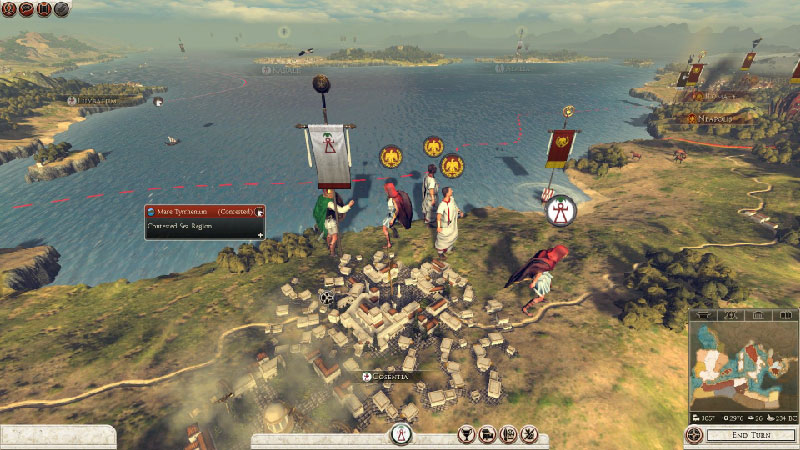Total War: Rome II is set in Europe, the Mediterranean, and the Near East in the Classical antiquity period. The grand single-player campaign begins in 272 BC and lasts for 300 years. However, the player also has the option to play further, as there are no timed victory conditions. Official Box Art for Total War: Rome II. Could someone adept at adding pictures/licensing them copy the Rome II box art photo from Total War's site and replace the Rome II logo with it? The box art is an official work by CA, and therefore better suited for the article than just a logo. I have seen it in better resolution on numerous gaming sites. Total War: ROME II – Rise of the Republic is a thrilling new campaign pack charting the events surrounding Rome in the 4th century BC. The campaign unfolds across a detailed map of Italy including Sicily, Sardinia, Corsica and Carthage, and depicts the tumultuous events which ultimately set the stage for the Second Founding of Rome. This campaign comes as part of Total War™: ROME II – Emperor Edition and is available as a free, automatic update to existing owners of Total War™: ROME II. The Imperator Augustus Campaign Pack is set in 42 BC during the chaotic aftermath of Caesar’s grisly murder. The republic remains whole, but its soul is divided as three great men. Support for Total War: ROME II. Please register for Total War Access to use the forums. If you're an existing user, your forum details will be merged with Total War Access if you register with the same email or username.
Rome Total War Xbox
Total War Rome II
- Game Info
- Spartan Edition
- Factions in Total War: Rome II
- Total War Cards: Punic Wars
- Using Total War Gameplay Footage
- System Requirements
- Downloadable Content (DLC)
- Greek States Culture Pack
- Nomadic Tribes Culture Pack
- Blood and Gore Pack
- Pirates and Raiders Culture Pack
- Caesar in Gaul Campaign Pack
- Hannibal at the Gates Campaign Pack
- Wrath Of Sparta Campaign Pack
- Free Downloadable Content (Free-LC)
- Pontus Faction
- Seleucid Faction
- Baktria Faction
- Getae Faction
- Historical Battle of Pydna
- Imperator Augustus Campaign Pack
Total War Rome 2 Beginners Guide

- War Room
- Politics Guide
- Trade Routes
- Assembly Kit
- Steam Workshop and How to Make Mods
- Media
- Teutoburg forest
- Let's Play videos
- Archives
- Books
- Capital Cities
- Dev Diaries
- Panoramic Screenshots
- Patch Notes
- Trailers
- Unit Spotlight
Featured Tutorial:
Introduction
The Second Punic War is, arguably, the most sweeping, destructive war of ancient times. It marked the end of a contest for power in the Mediterranean - the establishment of Roman hegemony over the entire Italian peninsula and deep into Iberia.
It was a hard fought victory for Rome, however; Hannibal Barca’s campaign in Italy, following his daring crossing of the Alps, nearly brought Rome to ruin. Catastrophic defeats at Trebia, Lake Trasimene and Cannae shattered any faith Rome’s allies had in them, and almost imploded the Republic.
The brilliance of Hannibal as a strategist and tactician cannot be denied; he came closer than anyone else ever had or would to toppling Roman power, but his failure was underestimating Rome’s ability to endure. After weathering the worst of Hannibal’s assault, Rome struck back under the brilliance of Scipio and finally, on the field at Zama, Carthage’s dream came crashing to an end.
Many accounts of the Second Punic War come from Polybius and Livy, neither of whom were alive when the events they describe took place and wrote only from Rome’s perspective. Polybius in particular, is famed for being openly critical of Carthage (he was allegedly present for the final destruction of the ancient capital), and in particular the Barcids, so his accounts are heavily biased towards Rome and can almost be considered propaganda.
Although the power plays of Julius Caesar, and the formation of the Roman Empire under Octavian, were still many years away, Rome’s victory over Carthage and its confederates laid the foundations for Rome the superpower.
